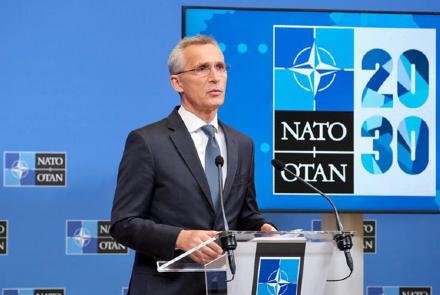Security Situation in Afghanistan Remains Challenging: NATO Chief

NATO Secretary General Jens Stoltenberg on Monday said that the security situation in Afghanistan remains “very difficult and challenging,” reiterating that as the US and coalition forces are leaving, at some stage, Afghans should take full responsibility for their own future.
Pentagon officials have said that the withdrawal up to 25% complete. US President Joe Biden announced in April that he will withdraw all American troops from Afghanistan by Sept. 11, but officials in Washington have said that the pullout might be completed earlier than the given deadline.
Back in Kabul, efforts are underway to resume the stalled peace talks in Doha and form a Supreme State Council to lead the peace process and make decisions on it. However, violence remains high as Taliban conduct attacks in at least 18 provinces every day, based on data provided by the Ministry of Defense.
Addressing a press conference in Brussels, Stoltenberg said that the decision to withdraw NATO troops entails risks, but also to stay, “we’d have implemented risks for our Alliance with more fighting, potentially more fighting, more and more casualties, and even the need to maybe increase the number of troops.”
He added, “So therefore, we made the decision to end our mission within weeks. I think we have to understand that the intention was never to stay in Afghanistan forever.”
He said that over the last years, NATO has gradually reduced its presence in Afghanistan from more than 100,000 troops to around 10,000 troops at the beginning of this year and that now it will go down to zero in the military mission.
“But as we end our military mission, we are stepping up our support to Afghanistan in other ways. First of all, we will maintain our civilian presence in Afghanistan to provide advice and capacity building to the Afghan security institutions,” he said.
He reiterated that NATO would fund the Afghan forces and will “make sure that we are allocating significant amounts of money to the Afghan security forces.”
“We will also provide, we are planning to provide out-of-country training for the Afghan security forces and we are also now working on how we can sustain critical infrastructure,” he added.
This comes as Afghan Defense Minister Asadullah Khalid on Tuesday said air support by international troops aiding Afghan forces might continue even after the end of the foreign military presence in Afghanistan if necessary.
“The world has a commitment and agreement with us. When needed–if we want and need it–their air force will help us in areas where we need it,” Khalid said.
Moreover, Stoltenberg said that Afghan forces are now responsible for the security in their own country.
“At some stage the Afghans have to take full responsibility, responsibility for their own future,” he said. “And I’m impressed by the strength and the courage of the Afghan security forces and knowing that there are risks, challenges, but also that’s exactly why we will continue to provide support to them.”
